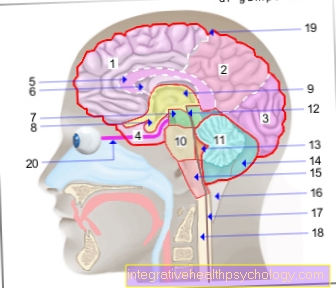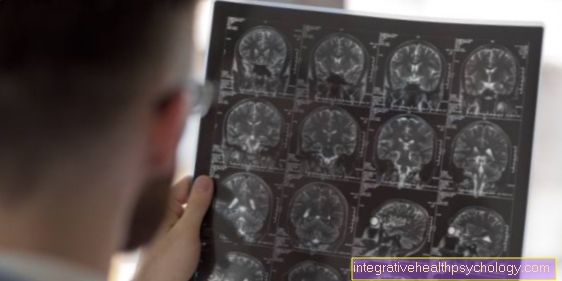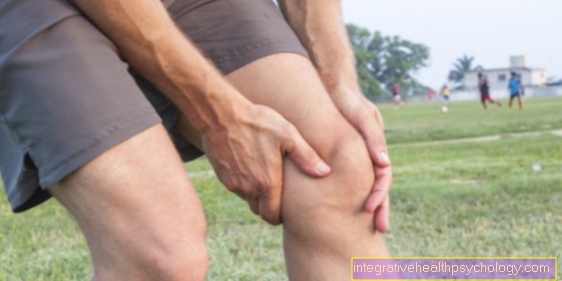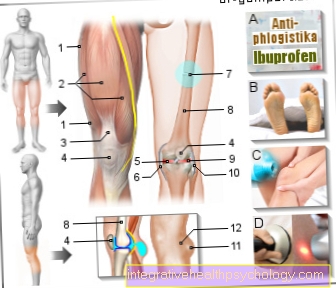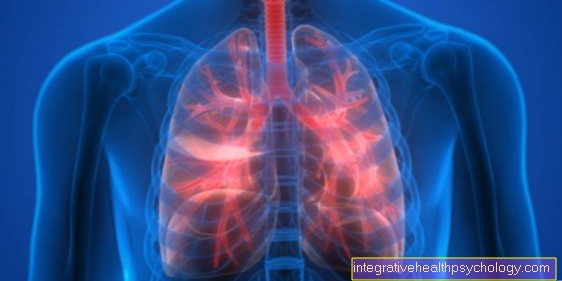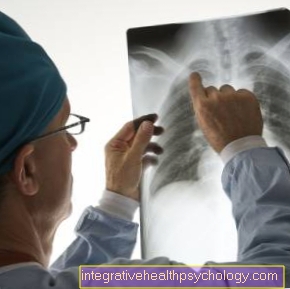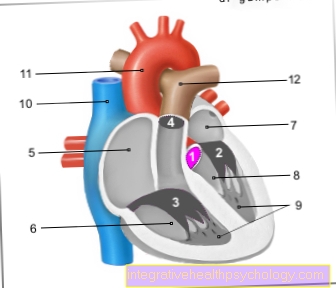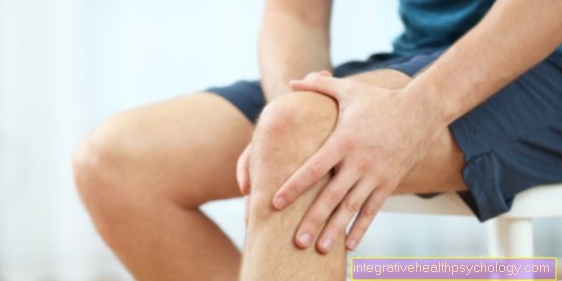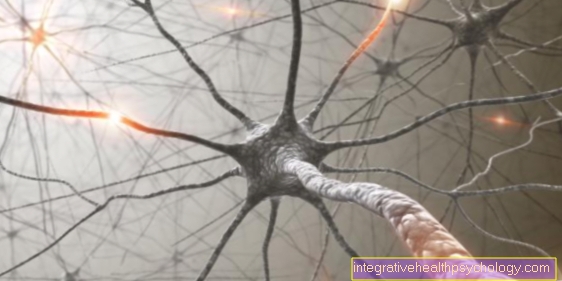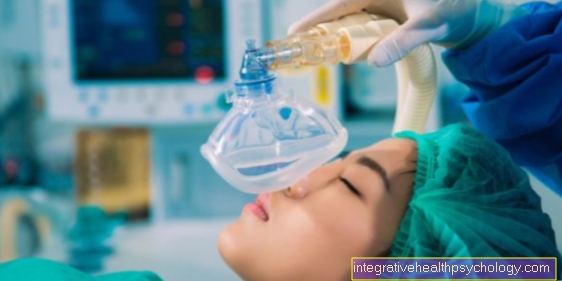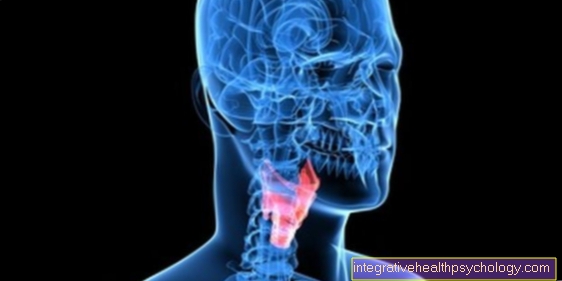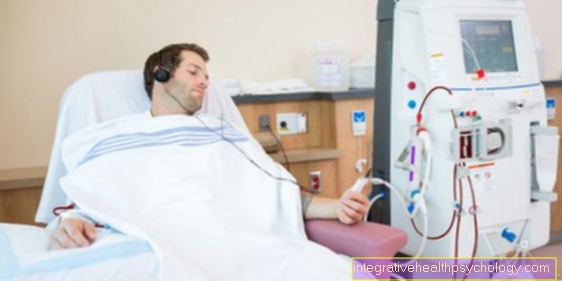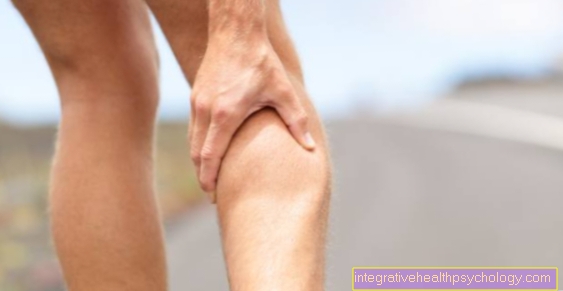Palpitations during pregnancy
General
Almost everyone knows a racing heart: you can feel the heart beating inside you, it is beating and pounding and you can feel the pulse clearly up to the carotid artery. In stressful situations, excitement, anticipation or intense physical exertion, a racing heart is a normal reaction of the body and passes again after a short time.
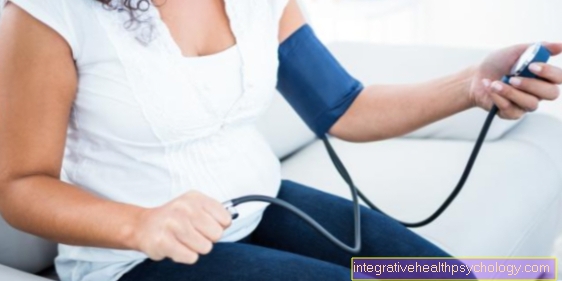
At rest, in an adult man, our heart pumps between 70 and 100 milliliters of blood per heartbeat into the circulatory system (this amount is slightly less in women). If the body is stressed, for example through sport, there is a higher demand for oxygen in the body and consequently a higher demand for blood. Since the amount of blood that is pumped out of the heart per cycle cannot be increased in large quantities, the body increases the frequency with which it pumps the blood into the circulation, i.e. the heartbeat.
When is palpitations normal and when not?
Palpitations during pregnancy can occur at any point in time and is more common between the 28th and 32nd week of pregnancy. Increased palpitations up to palpitations are particularly noticeable during periods of rest. Although the exact causes of occasional palpitations have not yet been clarified - one suspects one hormonal connection - in most cases this is not to be assessed as pathological.
Kick that Palpitations very often and it will be from one Palpitations and irregularities, advice should be given by a doctor.
There may be one Cardiac arrhythmia underlying. Palpitations can also be associated with an overactive thyroid and then occur together with a so-called goiter on the neck. This is an abnormal increase in the size of the thyroid tissue. If the racing heart is accompanied by other symptoms, such as paleness, hair loss, muscle cramps, etc., it may be one Lack of electrolytes.
Do you need to see a doctor?
A doctor's visit is with uncomplicated Racing heart not absolutely necessary. Drug therapy is also out of the question for these symptoms; in this case the body is best Rest and time to give to get used to the new situation and adapt.
However, the heart beats irregular, "stumbles“ or is one Known cardiac arrhythmia, it should be dated doctor with help of a EKGs to be clarified.
Even if one Thyroid disease is known, a racing heart should be avoided during pregnancy as a precaution doctor to be clarified.
Palpitations also require clarification and treatment if there is a Heart rate also increases blood pressure sharply. In this case, a doctor should be consulted urgently and therapy should be started. Symptoms for high blood pressure are a headache or a Feeling of pressure in the head, Visual disturbances, Dizziness and nausea. In some cases it can be due to the increased vascular pressure increased excretion of urine (Polyuria) come.
Occurrence in pregnancy - causes
During the pregnancy the entire body is tailored to the needs of the growing child rearranged. It also includes the body produces more blood, to the Care of the child to guarantee. In some cases, this change is accompanied by a racing heart. This is due to the fact that the heart passes through the increased amount of blood in pregnancy almost Transport 50% more blood must and accordingly his Increased performance. The heart beats stronger and faster than before and women perceive this as an uncomfortable palpitations.
Also severe stress can trigger palpitations or make an existing palpitations worse. However, the heart is racing almost always harmless and no cause for concern.
In most cases lies down racing heart after a while again by itself, when the body has got used to the new conditions of pregnancy.
You can find further information under our topics:
- Palpitations during pregnancy
- Insomnia During Pregnancy
Magnesium deficiency
The need for magnesium during pregnancy increasesespecially after the 22nd week of pregnancy. Magnesium is involved in many metabolic processes in the human body and is involved in the nervous control of muscle activity.
Among the symptoms of one Magnesium deficiency count besides Tingling sensations in the hands and feet, increased nervousness and high blood pressure, also muscle cramps. Typically kick Calf cramps and tension in the back area.
Cardiac arrhythmias in the form of Racing heartn can also be an expression of a magnesium deficiency.
Iron deficiency
The need for iron is increased during pregnancy. If there is no compensation for the increased demand on the part of the diet and if the iron stores are exhausted, a deficiency occurs.
A slight iron deficiency manifests itself with symptoms such as paleness, fatigue and difficulty concentrating. A more advanced deficiency appears with palpitations, shortness of breath and changes in mood. Since iron is also a component of the red blood cells, which transport oxygen, the heart has to pump more with fewer oxygen transporters in order to supply all organs with sufficient supplies.
Read more on the topic:
- Iron Deficiency During Pregnancy
and - You can recognize iron deficiency by these symptoms
Pregnant women belong to the risk group for iron deficiency and should therefore ensure that they are adequately supplied.
thyroid
The size of the thyroid takes as a result of increased hormone requirements during pregnancy easy to. If the increase in size exceeds a certain amount, however, one speaks of a Goiter, which at a Hyperthyroidism can occur. A hyperthyroidism is one Overactivity of the thyroid gland and is a possible trigger of the heart racing. The autoimmune one Graves disease causes an overactive thyroid and must be treated immediately. Pregnancy-induced hyperthyroidism can also be triggered by the hormone chorionic gonadotropin produced during this time. It is similar to the thyroid hormone TSH and stimulates the thyroid to become more active. However, this form of hyperfunction is usually no longer found after the 20th week of pregnancy.
A Hyperthyroidism usually goes with an unspecific one Complaint picture from palpitations, sleep disorders, nervousness, sweating, hair loss and increased fear.
With an overactive thyroid there is an increased risk of a so-called pre-eclampsia, a premature detachment of the placenta. Also the Probability of premature births and miscarriages as well as malformations increases.
Hyperthyroidism during pregnancy should therefore usually be treated with medication.
You might also be interested in this topic: Hyperthyroidism
Racing heart at night
Kick Racing heart during pregnancy at night this does not automatically have a pathological value.
The expectant mother's heart is faced with the challenge of up to one in pregnancy 40% increased amount of blood not only to pump through one's own body, but also through that of the growing child.
In addition to the blood volume, the changed ones also play a role Pressure ratios on organs and blood vessels as a result of pregnancy. This is particularly important when lying down and is particularly important in more advanced weeks of pregnancy for pressing the inferior vena cava, the so-called inferior vena cava. The large vessel carries the blood from the lower half of the body back to the heart. If the resistance is increased in this way, the heart has to pump more and increases its beating frequency. It is therefore a natural mechanism of the human body.
The vessel is squeezed most of the time in the supine position, which is why it is best to relax Position on the side.
therapy
In the therapy of High blood pressure in pregnancy represents the symptomatic treatment the means of choice, i.e. bed rest, physical rest and a balanced diet.
For more complicated courses and persistent high blood pressure, a medical therapy With Alpha methyldopa, Beta blockers or Hydralazines be considered.
You can find much more general information on this topic at: Therapy of palpitations
Vena cava compression syndrome
Another possible trigger for the racing heart during pregnancy is the so-called Vena-Cava Compression Syndrome.
This is a pregnancy complication which leads to Circulatory disorders of the mother caused by the pressurethe child in the Uterus on the inferior vena cava (Inferior vena cava).
The syndrome mainly occurs against End of pregnancywhen the child has already reached a certain height and weight. This can happen if the mother is in Supine position and the uterus presses on the vena cava, which draws blood from the lower extremity transported to the heart; thus becomes the Reduced blood flow to the heart. The heart registers that less blood is reaching it and tries that decreased blood volume through actions like a to compensate for increased heart rateto ensure continued adequate blood supply. However, the heart cannot permanently compensate for this condition. If the compression of the vena cava by the uterus persists for a long time, it can too severe circulatory problems, how Drop in blood pressure and dizziness up to shock and unconsciousness come.
The vena cava compression syndrome and the associated syndromes can be remedied very quickly and easily by the pregnant woman in Lateral position embarks. Preferably on the left side, as the vena cava is spared the most in this position. The vena cava runs on the right side in front of the spine along to the heart, accordingly compression of the vein can still occur when lying on the right side. On the left side should within a few minutes all symptoms and ailments disappear. Avoid lying on your back for long periods to prevent the syndrome.
In extreme cases Vena Cava Compression Syndrome can increase life threatening situations for mother and child and due to the reduced blood supply to the child one Premature birth trigger. Therefore, if the symptoms occur once during the further pregnancy, attention should be paid to the correct lying position, especially at night.
You can find more information on this topic under the accompanying leading article: Vena-Cava Compression Syndrome

